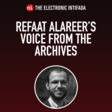The Electronic Intifada Podcast 23 November 2015
Israeli forces continue to carry out lethal and violent attacks against Palestinians, killing more than 85 and injuring more than 9,000 since 1 October. At least 16 Israelis have been killed in the same period.
“What has been happening can be classified as unprecedented, at least since the second intifada — both in terms of the numbers of people who are going to protests on a regular basis and the repression that Israel is having to employ in order to crush the uprising,” said Budour Youssef Hassan, a writer and law graduate based in Jerusalem.
In a recent interview with The Electronic Intifada, Hassan added that the resistance movements are largely self-organized and protesters don’t rely on Palestinian political or factional leadership.
“The Israeli occupation forces are surprised … they didn’t expect [the resistance] to be as sustainable as it has been,” she said.
Hassan explained that the ways Palestinians across the occupied West Bank and Gaza Strip and inside present-day Israel are defending themselves illustrate both individual and collective rejection of the current — and historical — situation.
“This status quo cannot be sustained forever — a change has to be created,” Hassan said.
Israel denies “right to mourn”
In her recent reporting for The Electronic Intifada, Hassan has focused on the stories of Palestinians killed by Israeli forces and the impact that the loss — and Israel’s further collective punishment policies — has on their families and communities.
“[I] speak with families whose children’s corpses haven’t been returned to them — this was especially painful,” she said. “Waiting for a son’s corpse to be released as if they were waiting for a prisoner exchange deal, for the release of an alive prisoner.”
“Some of them [don’t believe] that their children have been killed because they say, ‘I haven’t seen a corpse, I cannot believe that my son has been killed unless I see his corpse with my own eyes, unless I can bury him or her with my own hands,’” Hassan added.
“When the ultimate dream of a mother or father becomes to bury their son or daughter, you know how much this occupation, this colonial system has destroyed our lives — and has done so many grave violations against our most basic rights, even the right to mourn,” she said.
“When even this very basic right is denied, how can people wonder why Palestinians are rising up?”
Listen to the interview with Budour Youssef Hassan via the media player above.
Image: A Palestinian youth throws back a tear gas canister during clashes with the Israeli army in the occupied West Bank city of Bethlehem on 20 November. Anne Paq/Activestills
You can subscribe to The Electronic Intifada podcast on iTunes (search for The Electronic Intifada). Support our iTunes podcast by rating us and leaving a review.






Comments
"Mourn For the Dead, Fight Like Hell for the Living."
Permalink Zionism Is Not Judaism replied on
Well... if one can't do A, one must move on to B.
Love u Palestine & stay strong
Permalink Jane Zacher replied on
I stand with you, forever - stay strong.
Jane Zachary
Student
Philadelphia PA